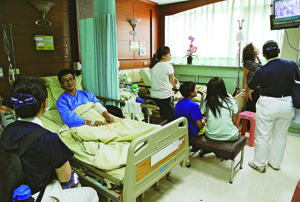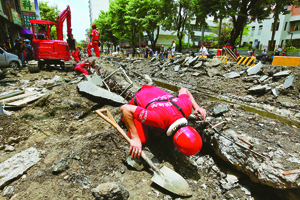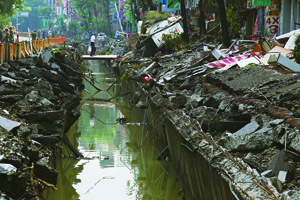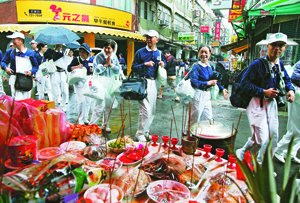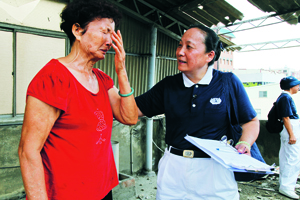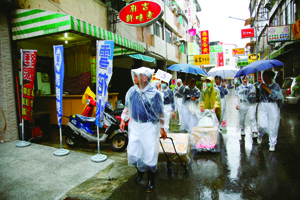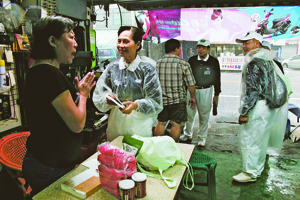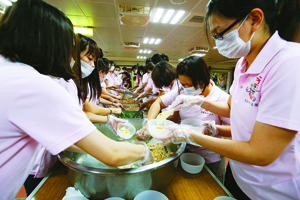

| Steadying the Unstable | ||||||||||||||||||||
| By Li Wei-huang Translated by Tang Yau-yang Photos by Lin Yan-huang | ||||||||||||||||||||
Just before midnight on July 31, a series of explosions caused by an underground gas leak in Kaohsiung, Taiwan’s second largest city, ripped open six kilometers (3.7 miles) of roads, killed at least 32 people and injured 309. Tzu Chi volunteers delivered meals and supplies and comforted victims. When their traumatized hearts settle down, recovery can begin.
Late in the night of July 31, Li Xiu-chuan (李琇釧) was troubled to learn that there had been explosions not very far from her home in Kaohsiung. At the time, she was at home getting ready to leave for her graveyard shift at the post office, where she worked as an hourly contract employee sorting mail. She hurriedly called her supervisor and asked him for time off so she could help victims in the aftermath of the explosions. She put on her Tzu Chi volunteer uniform and rushed to a nearby hospital where she figured at least some of the injured victims would be sent. Like Li, Liu Dan-li (劉丹莉) also lives in Lingya District. She heard two loud blasts at five minutes to midnight. Experience told her to expect injured people. She too put on her volunteer uniform and rushed out of her house to see what she could do to help. She saw people clustering here and there in small groups. They didn’t know what to do, so she urged them to stay away from the explosion site. She helped direct traffic, diverting cars and motorcycles away from the scene to keep it accessible for emergency response vehicles. Then Liu hastened to Kaohsiung Armed Forces General Hospital. On the way there, she called other volunteers to duty. The emergency departments at many area hospitals were soon packed with the injured, their family members, and people looking for their loved ones in the midst of the chaos. The growing crowds were more than the hospital personnel could handle. Many people turned to uniformed Tzu Chi volunteers for help. Volunteers helped get prescriptions filled, fetched drinking water, and contacted family members on behalf of the injured to take care of the required paperwork for admission or surgery.
Li rounded up scores of volunteers that night to chant the name of Amitabha Buddha for the deceased. She was busy through the night and the next morning. Around noon she went with other volunteers to Sanduoyi Road, a heavily damaged area, to deliver bottled water and hot boxed meals to people living in that neighborhood. That afternoon, Li contacted Liu and together they planned for volunteers to make home visits in Lingya District the following day, August 2. They decided to divide the volunteers into 13 groups. Each group was to deliver hot meals to families along a specified route and assess their damage. Li didn’t go home to rest until eleven o’clock the night of August 1. She had not shut her eyes for 23 hours straight.
The calamity
The explosions, triggered by propylene gas leaking from underground pipes, affected a three square kilometer (740 acre) area in Qianzhen and Lingya Districts along Yixin, Ersheng, Sanduoyi, and Kaixuan Roads. Those were major thoroughfares heavily traveled during the day. The midnight blasts killed 32 people, wounded over 300, and unnerved many more. The infrastructure in the area sustained serious damage. Utilities including natural gas, electricity, and water were cut off in some areas, impacting nearly 84,000 people in about 33,000 families. Ninety-eight schools were temporarily shut down. “If the catastrophe had occurred during the day, the casualties would have been unimaginably higher,” said many survivors, trying to find a silver lining. Many Tzu Chi volunteers lived in the disaster zone themselves, but they nonetheless pitched in to help soon after the calamity. They couldn’t see clearly the extent of the damage in the darkness of the night, but in the light of the morning they saw how severe the devastation was. Their familiar streets had been ripped open, forming trenches along the roads. The powerful explosions reportedly blew cars and motorcycles high in the air. Many vehicles were left overturned on the roads; some were buried under debris. Pieces of broken asphalt flew like shrapnel, damaging roofs, walls, and windows. Some even went through windows and injured residents inside.
Love, care and warm meals After obtaining permission from the authorities, Tzu Chi volunteers entered the disaster area and provided hot food for residents. Water and electricity services were temporarily disrupted, so cooking was inconvenient. For days, Li and other volunteers gathered before lunch and dinner time at the Tzu Chi emergency service station in a school on Sanduoyi Road. They picked up boxed meals and bottled water, traversed temporary crossings over the trenches in the main roads, walked into lanes and alleys, and delivered the food and water to those who needed them. They also chatted with the residents.
Occasionally volunteers smelled something odd on their delivery trips. It was understandable why rumors were flying around about potential dangers lurking in the air. People were still quite edgy. Most victims were unprepared for the lack of electricity and water. Most of them had only experienced disasters remotely, through the media; they had never thought that they would one day be victims themselves, much less people receiving assistance. Therefore it was not unusual for volunteers to see tearful eyes when they handed over meals and water. Li met an old couple on one of her trips. The woman cried when she told Li about her worries. “What are we going to live on?” the old woman asked. “The more I think about it, the more scared I become.” Li comforted the couple by saying that their property damage could be repaired and that the most important thing was that they were not injured.
Another resident said, “You’ve delivered meals to us every day for several days now. You even asked if the food was to our taste. You’ve made us feel so much warmth.” Liu said that she had also heard feedback from residents that the food volunteers delivered was “life-saving,” in that it not only fed their stomachs but warmed their hearts and soothed their upset minds. In order to add variety to the meals and make them more appealing, volunteers in the kitchen of the local Tzu Chi office prepared and rotated through nearly 20 vegetarian menus. Making the food attractive was a challenge, but the logistics of preparing several thousand boxed meals were also quite daunting. To make one boxed meal was easy, but to make several thousand of them was another story. For that, volunteers mobilized many voluntary helpers, who scooped steamed rice into meal boxes, topped the rice with vegetables, replaced the lids, packed the boxes into large cartons, and sealed the cartons for delivery. Several lines of people worked concurrently so that the multitudes of meals could be ready in time.
The food was then transported to neighborhoods. Volunteers also made special deliveries to hospitals and the central funeral parlor for survivors or family members. A grand total of 80,034 hot meals were distributed from August 1 to 30. The disaster brought out the love of many people. In addition to those who came on their own initiative to help pack the meals, people came to the Tzu Chi service stations in the disaster area to donate goods. A mother and her daughter arrived at one station with many packages of tissue paper and asked volunteers to distribute them to victims. There were also young people who showed up at the stations and signed up as volunteers. They did whatever work was assigned to them. The sweltering heat did not deter them in the least.
Home visits Tzu Chi held prayer services—including ones at Chung-Cheng Industrial High School on August 3, Fukang Elementary on the 5th, and Ying-Ming Junior High on the 17th—to help the affected communities heal. Volunteers encouraged the participants to bless each other to help restore peace to their minds.
On the afternoon of August 6, Tzu Chi kicked off a project in which volunteers from Kaohsiung and other areas in Taiwan took turns calling on homes in the disaster areas. Every day for ten days, about a thousand volunteers split into 200 to 300 teams and called on one household after another on designated routes. They visited victims as well as people who had not suffered physical losses but were anxious because they lived near where the explosions had occurred. At each door, volunteers handed over a letter from Master Cheng Yen and a gift pack of Tzu Chi-made food items. By doing so, they hoped to deliver a message of care and support on behalf of all the members of the foundation around the globe. Through these visits, volunteers were also able to identify people who might need help with child education, medical care, or elderly care. Local volunteers would follow up with these families and plan long-term care.
As if the explosions had not caused enough damage themselves, thunderstorms fell on Kaohsiung unrelentingly for a week soon after the catastrophe. They caused flooding in parts of the explosion zone, made getting around difficult and soured people’s moods. Volunteers found during their trips to the area that many people, even those whose homes had not been damaged in the explosions, had temporarily moved away and were staying with friends or relatives. After a major disaster, virtually anything can lead people to panic. Even the sounds of raindrops or thunder—some of the most ordinary phenomena in nature—can startle people. It is no wonder that people moved away to stay in places where they felt safer. Volunteer Li Mei-ru (李美儒), from Taoyuan in northern Taiwan, related a story about an old man who had lived through air raids in World War II. The gas explosions reminded him of those days. A mother said that she was terribly scared when the blasts broke windows in her home, and that her son even had nightmares every day after the explosions. Although many people recounted their traumatic experiences to the volunteers, even more thanked them for the hot meals they provided after the disaster. A woman who ran an automobile service shop on Sanduoyi Road said that after the disaster she was in no mood to eat, much less to cook. If volunteers had not delivered meals to her home, she would not have cooked or even bought any meals.
Volunteers called on more households in the latter part of August, and by August 26 they had visited over 10,000 homes. During these visits, they expressed their sympathy and good wishes and distributed nearly 9,500 packs of food, which included instant noodles and rice, multigrain drink mix, nuts, and biscuits. Starting in late August, volunteers also gave cash aid to families whose houses had been damaged. One volunteer Li Xiu-chuan, the volunteer who took time off from her job at the post office, worked hard after the explosions to help with and coordinate relief efforts. She left home early and returned home late every day. She worked even at night with other volunteer coordinators to plan the home visit routes that 200 to 300 volunteer teams would take the next day. Such a heavy workload invariably ate into her family time, and her husband was not very happy with that. Li tried her best to appease him. For example, according to local custom, August 10 is a day for paying respects to one’s ancestors with offerings. On that day, Li got up at four o’clock to get the offerings ready. Only after that had been taken care of did she set out in the rain to start another day of home visits on behalf of the foundation. Over the years Li has volunteered in Tzu Chi relief efforts after many disasters in and around Taiwan. In 2007, an army helicopter crashed in the mountains of Kaohsiung, killing eight soldiers. She and other volunteers went to console mourning family members. That was a particularly difficult mission for Li, whose husband also worked in the military. When she got home that day, she could not help crying at her front door. She was busy for six months after Typhoon Morakot devastated southern Taiwan in 2009, helping to clean up communities, conduct home visits to assess needs, and build new homes for victims. She frequently took time off from work during that time. A domestic passenger plane crashed in Magong, Penghu, an offshore island county of Taiwan, on July 23, 2014. In response, Li took four days off work and traveled there with her fellow Tzu Chi volunteers to help. On the evening of July 31, just three days after she had returned from Magong, she was off again to help victims of the Kaohsiung explosions. Witnessing so many life and death situations has taught her to appreciate her husband and children more, and she thanks them for letting her devote so much time to Tzu Chi. She is also grateful to her supervisor at the post office for allowing her to take time off from work when she needs to volunteer for Tzu Chi. To help in the aftermath of the disaster, Li again took more than a half month off from work. Her supervisor allowed her to do that not only because he appreciated her kind-heartedness in helping the less fortunate, but also because she was a good worker. All that time off from work also meant less pay, but Li did not mind at all. Like all other volunteers, she feels it is all worth it if they can help restore peace of mind to people who have been through the trauma of a horrible disaster. |















|


